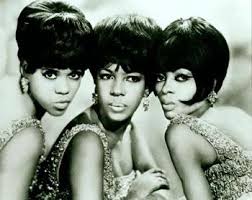



One of Motown's signature acts, The Supremes were the most successful black musical act ( whose success rivaled the Beatles) of the 1960s recording twelve #1 hits between 1964 and 1969, many of them written and produced by Motown's main songwriting and production team, Holland-Dozier-Holland. The crossover success of the Supremes during the mid-1960s paved the way for future black soul and R&B acts to gain mainstream audiences both in the United States and overseas.
Unlike their predecessors, the Supremes became the first black female performers to embrace a more feminine image. Much of this was accomplished at the behest of Motown chief Berry Gordy and Maxine Powell, who ran Motown's in-house finishing school and Artist Development department. Also, unlike many of her contemporaries, Diana Ross sung in a thin, calm voice, and her vocal styling was matched by having the girls embellish their own femininity instead of imitating the qualities of male groups. Instead of the plain appearances and basic dance routines, the Supremes' on-stage appearance featured high-fashion gowns and wigs, detailed makeup, and graceful choreography. Gordy wanted the Supremes, like all of his performers, to be equally appealing to black and white audiences, and he also sought to erase the image of black performers as being unrefined or lacking class.
By 1965, the Supremes were international stars. They toured the globe, becoming almost as popular abroad as they were in America. Almost immediately after their first #1 hits, they recorded songs for motion picture soundtracks, appeared in the 1965 film Beach Ball, and endorsed dozens of products, even at one point having their own brand of bread. By the end of 1966, their #1 hits also included "I Hear a Symphony", "You Can't Hurry Love", and "You Keep Me Hangin' On"; and their 1966 album The Supremes A' Go-Go became the first album by a female group to make it to #1 on the US album chart.
Popular with white audiences as well as black audiences, Gordy had the Supremes cater to their middle American fan base, grooming them for performances at renowned supper clubs such as the Copacabana in New York. Broadway and pop standards were incorporated into their repertoire alongside their own hit songs. As a result, the Supremes were arguably the first black musical act – male or female – to become a complete crossover success since the days of Cab Calloway. The black rock and roll musicians of the 1950s saw many of their hit tunes covered by white musicians, with the covers achieving more fame and sales success than the originals. Partially because of Diana Ross’ pop-friendly voice, The Supremes became hugely popular with international mainstream audiences. The group broke down many racial barriers, becoming one of the first black musical acts to appear regularly on television programs such as The Ed Sullivan Show, and achieving the crossover success Berry Gordy had been pushing for, paving the way for the mainstream success of labelmates such as The Temptations, The Four Tops, and Motown's 1970s pop sensation The Jackson 5
Decline
Holland-Dozier-Holland left Motown in late 1967 after a dispute with the label over royalties and profit sharing, and the quality of Motown's output (and Diana Ross & the Supremes' records in particular) began to falter. From the release of "Reflections" in 1967 to the release of "The Weight" in 1969, only six out of the eleven released singles reached the Top 20, and only one of those, 1968's "Love Child", managed to make it to #1. Because of the tension within the group and stringent touring schedules, neither Mary Wilson nor Cindy Birdsong appear on many of these singles; they were replaced on these recordings by session singers such as The Andantes.
The changes within the group and their decreasing sales were signs of changes within the music industry. The gospel-based soul of female performers like Aretha Franklin and Gladys Knight of The Pips had eclipsed the Supremes' pop-based sound. In a cultural climate now influenced more than ever by countercultural movements such as the Black Panther Party, the Supremes found themselves attacked for not being "black enough", and lost ground in the black music market as a result.
In mid-1968, Motown began a number of high-profile collaborations for the Supremes with their old colleagues, The Temptations. Besides the fact that both groups had come up together, the pairings also made financial sense, since the Supremes had a mostly white fanbase, and the Temptations a mostly black fanbase. Among the joint projects were two studio LPs (Diana Ross & the Supremes Join The Temptations, featuring the #2 hit single "I'm Gonna Make You Love Me", and Together), a joint tour, and two NBC television specials, TCB (aired December 9, 1968) and G.I.T. on Broadway (aired November 12, 1969).
 Report post to moderator
Report post to moderator Report post to moderator
Report post to moderator New topic
New topic Printable
Printable